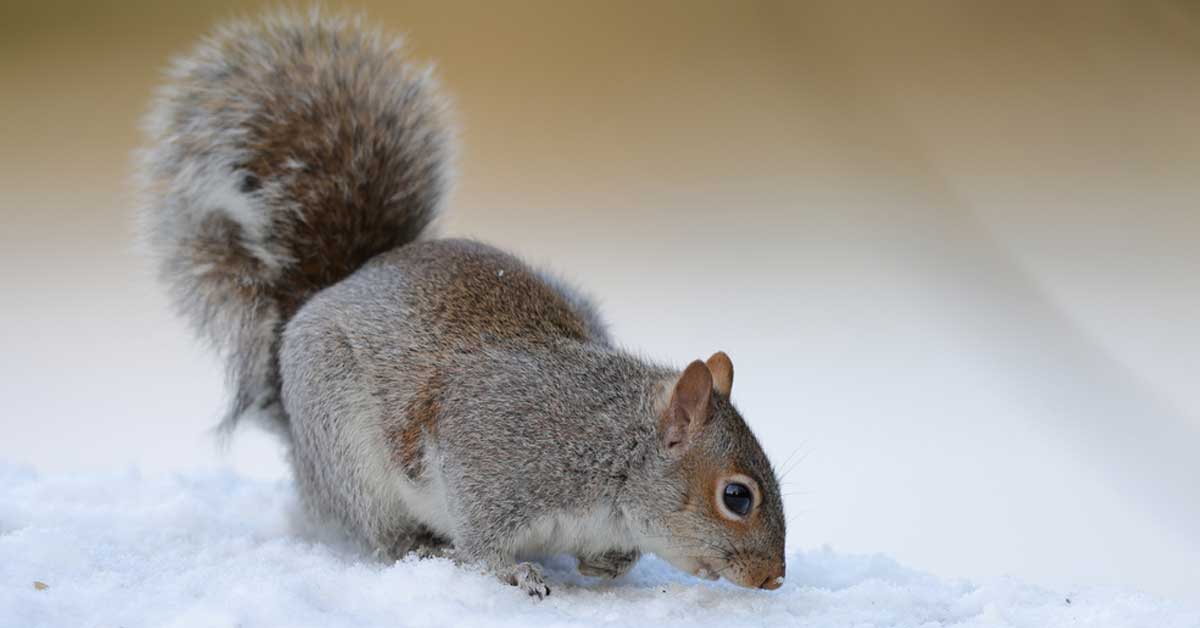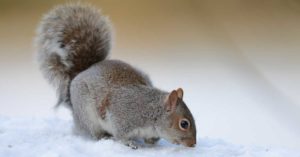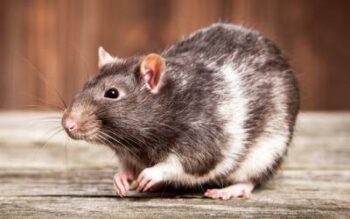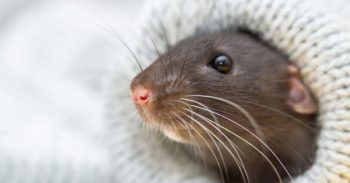
 The decrease in squirrel activity in winter often makes people think that squirrels migrate or hibernate. In reality, it is more complicated.
The decrease in squirrel activity in winter often makes people think that squirrels migrate or hibernate. In reality, it is more complicated.
Understanding migration and hibernation is a good way to start. Migration is when a group or species of animals move seasonally, such as when animals migrate to follow the rains or a food source… or when geese head south for the winter to avoid the cold. Migration, however, involves returning to the original location.
Hibernation isn’t sleeping through the winter – though that’s the popular conception of it. Hibernation is when an animal’s metabolism slows so it can survive the winter. Breathing rate and heartbeats slow down. In preparation for hibernation, the animals typically put on weight so they can live off the fat during hibernation.
Do Squirrels Hibernate in Winter?
That depends upon the type of squirrel. Ground squirrels will hibernate, but tree squirrels (which include the gray squirrels common on Long Island) do not hibernate.
In the winter, gray squirrels huddle together in their dens (often with other squirrels) for warmth. Gray squirrels typically create nests up in trees or make their dens in a tree hollow. Because they don’t truly hibernate, you may occasionally see them in the winter… but for the most part, they’ll huddle together in their dens for warmth.
Before winter comes, squirrels will eat a lot to bulk up for the winter. For ground squirrels, this is an important part of hibernation. For gray squirrels (also called tree squirrels), this extra fat helps to keep them warm though they will also access the food they stored in advance – if at all possible – to sustain them over winter. Some squirrels will also seek shelter in your home if given an opportunity. This is one reason why squirrel-proofing is so important.
Gray squirrels also stay warm by shivering to generate heat. This is especially effective when a group of squirrels huddle together for warmth. Certain types of bees do something similar for hive survival in the winter.
Do Squirrels Migrate?
Squirrels tend to stay where they are but may roam an area. Migration is essentially a circular process. A species starts in location A and then moves to location B because of weather, seasonal changes, or to follow a food or water source. Then, when circumstances reverse, they move back to location A. Squirrels do not do this… but Canadian geese and monarch butterflies do.
However, squirrels will occasionally move to another location (if necessary), but it’s a permanent move. They do not return to their original home afterward, so it’s not considered migration. Squirrels will relocate because of:
- Over-population
- Fire
- Flooding
- Famine
- Pests
Unfortunately, people constantly misuse the term “migration” when referring to squirrel movement. The most famous example is the event known as “The Great Squirrel Migration of 1968.” An abundant crop of acorns and chestnuts in 1967 on the East Coast led to an extremely high squirrel birth rate in early 1968.
That autumn, a substantially lower crop than usual of acorns and chestnuts meant the squirrels were going hungry, so they moved out en masse in search of a new home with sufficient food. Squirrels were seen swimming the Hudson River, with many dying of exhaustion in the effort. Many others were hit by cars at a much higher rate than usual.
While sad yet predictable under the circumstances, labeling it a “migration” is incorrect. The squirrels that survived stayed in their new homes and never returned to their original location… which a true migration would involve.
How Far Do Squirrels Roam?
Not very far, unless they’re seeking a new home. On average, squirrels tend to cover a range of about 5-7 miles. A range of 10 miles is rare. When relocating squirrels, they’re commonly moved more than 10 miles from the original location.
Where Do Squirrels Get Fresh Water in Winter?
What squirrels do for water in the winter depends upon the type of squirrel. Non-hibernating squirrels (like Long Island’s Gray Squirrels) will seek out water that isn’t frozen, such as from heated ponds and bird feeders. If that’s not an option, squirrels will bring snow or pieces of ice back to their den and drink it when it melts.
For hibernating squirrels, researchers were puzzled as to how they avoided dehydration. They examined squirrels that don’t hibernate and two groups of those that do – squirrels in deep hibernation torpor and those that are hibernating but in a “drowsy” state. The hibernating squirrels had an extremely low serum or blood concentrate level. Usually, that makes a person or animal thirsty… so that didn’t answer the question of how squirrels survive hibernation without fresh water.
The first assumption was that the squirrels drank a lot of water during their preparation for hibernation, but that’s not the case. In fact, they drank far less than usual. Further testing revealed that the squirrels’ metabolism removed electrolytes, sodium, urea, glucose, and other chemicals from their blood and stored them elsewhere in the body, probably the bladder.
Let Arrow Solve Your Squirrel Problem
If squirrels are causing problems on your property, you don’t have to struggle. Call Arrow Exterminating and let our professionals handle it. To get started, contact Arrow Exterminating today.




